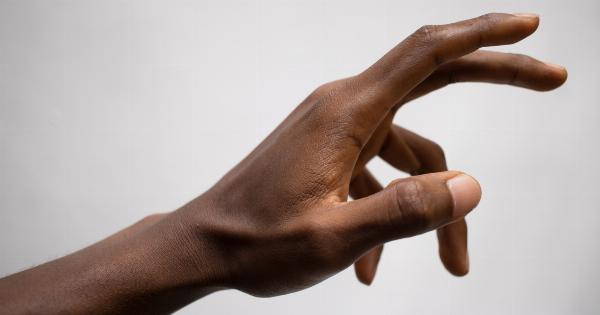Nail biting, also known as onychophagia, is a widespread habit that affects people of all ages. It is estimated that about 20-30% of the general population engages in nail biting to some extent.
This seemingly harmless habit can have several underlying causes, such as stress, anxiety, boredom, or even a subconscious longing for perfection.
While nail biting can be seen as a nervous tic or a way to cope with life’s challenges, did you know that this habit can also reveal certain aspects of your personality?.
Types of Nail Biters
Before we delve into the relationship between nail biting and personality, it is important to understand the different types of nail biters. By observing the way people bite their nails, we can categorize them into four distinct types:.
1. Occasional Nail Biters
Occasional nail biters indulge in nail biting from time to time without it becoming a regular habit. They usually engage in this behavior when they are stressed, anxious, or bored.
Occasional nail biters often have more control over their habit and can stop biting their nails for longer periods.
2. Chronic Nail Biters
Chronic nail biters, on the other hand, find it difficult to resist the urge to bite their nails. They engage in this habit consistently, regardless of their emotional state.
Chronic nail biters often bite their nails to the point of bleeding or causing damage to the nail bed. This type of nail biting may be linked to underlying psychological disorders such as obsessive-compulsive disorder (OCD).
3. Acute Nail Biters
Acute nail biters are individuals who bite their nails only during certain situations or when facing specific triggers.
For example, someone who bites their nails only when they are nervous before a presentation or when waiting for an important phone call. This type of nail biting is often a response to acute stress or anxiety.
4. Habitual Nail Biters
Habitual nail biters are those who have developed nail biting into an ingrained habit. They engage in this behavior without even realizing it and often bite their nails absentmindedly.
Habitual nail biters may not necessarily be aware of why they started biting their nails in the first place and find it challenging to break the habit.
Personality Traits and Nail Biting
Now that we have explored the different types of nail biters, let’s delve into how this habit can reveal certain personality traits:.
1. Perfectionism and Attention to Detail
Individuals who exhibit perfectionist tendencies often feel a strong need to have everything in their life perfectly aligned. They can be meticulous, detail-oriented, and highly organized.
Nail biting can be a manifestation of this personality trait, as these individuals may bite their nails to fix any perceived imperfection or unevenness.
2. Impatience and Restlessness
People who find it challenging to wait or remain idle may resort to nail biting as a way to channel their restlessness or impatience. They may engage in this habit as a means of relieving tension or keeping themselves occupied.
Nail biting can provide temporary relief from the feeling of restlessness and the desire for constant engagement.
3. Anxiety and Nervousness
For many individuals, nail biting is directly linked to anxiety and nervousness. It can serve as a coping mechanism to help manage feelings of stress or tension. Nail biting releases tension and temporarily reduces anxiety.
Those who struggle with anxiety disorders or experience high levels of stress are more likely to engage in nail biting behaviors.
4. Perseverance and Determination
While nail biting is often associated with negative personality traits, it can also suggest positive qualities such as perseverance and determination.
Some individuals may bite their nails when faced with challenging tasks or difficult decisions, seeing it as a way to maintain focus and drive. The act of nail biting can help them gather their thoughts and find the resolve to overcome obstacles.
5. Sensitivity and Emotional Vulnerability
Those who are more emotionally sensitive or vulnerable may find themselves resorting to nail biting as a response to heightened emotions.
Nail biting can provide a sense of comfort and distraction, helping individuals temporarily escape or numb themselves from overwhelming emotions. It can serve as a way to self-soothe during times of distress.
6. Compulsivity and Control Issues
Chronic nail biters may have underlying issues with self-control and impulsivity. This type of nail biting can be associated with psychological disorders such as obsessive-compulsive disorder (OCD).
The act of biting nails becomes a compulsive behavior driven by the need for control. Individuals with control issues may find relief in the repetitive action of nail biting.
Breaking the Habit
If you identify yourself as a nail biter and wish to break the habit, there are several strategies you can try:.
1. Awareness and Mindfulness
Start by becoming aware of your nail biting behavior. Notice the triggers that lead you to bite your nails and the situations where it is most prevalent.
By practicing mindfulness, you can catch yourself in the act and redirect your attention to a healthier habit or coping mechanism.
2. Substitute the Habit
Replace your nail biting habit with a more constructive and less damaging activity. For instance, carry a stress ball or fidget toy that you can squeeze or play with whenever you feel the urge to bite your nails.
This substitution can help redirect your nervous energy.
3. Regular Maintenance and Care
Take good care of your nails by keeping them trimmed, filed, and manicured. By maintaining your nails’ appearance, you may be less inclined to bite them.
Consider applying nail polish or using bitter-tasting nail products specifically designed to discourage nail biting.
4. Seek Support
If nail biting becomes a persistent and challenging habit to break, consider seeking support from a therapist or a support group. They can help you explore the underlying causes and develop healthier coping mechanisms to replace nail biting.
Conclusion
Nail biting may seem like a trivial habit, but it can provide valuable insights into certain aspects of your personality.
Whether you are a chronic nail biter, an occasional nail biter, or fall into any other category, understanding the underlying triggers and psychological factors can help you gain a better understanding of yourself. Breaking the habit of nail biting can also signify personal growth and the development of healthier coping mechanisms.


























